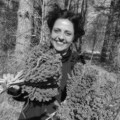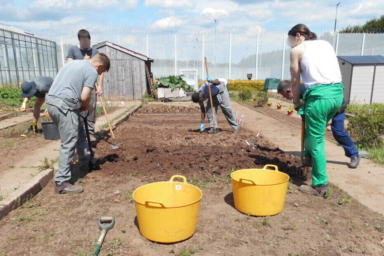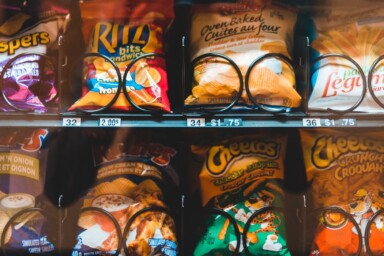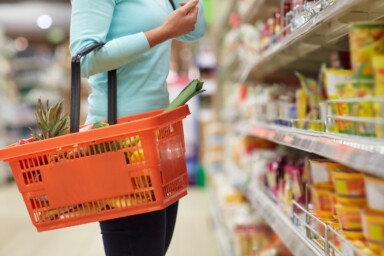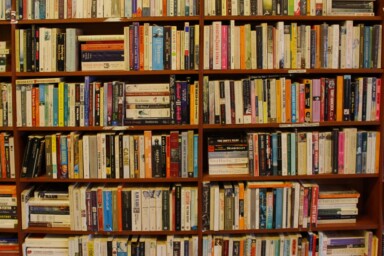In this piece originally published by Mold Magazine, Vivien Sansour, founder of the Palestine Heirloom Seed Library, dares us to be bold and imaginative in the face of crisis. Are we brave enough to imagine a food system that does not involve old paradigms, and can we imagine a chain of production that is truly diverse and integrative?
St. George is said to have been a wanderer, a man who left his small village in Turkey to roam the world in search for ways to become more of who he is: a generous hero who provided safety and abundance for the communities he encountered. It is also said that in his voyage he turned up in Palestine, in a small village outside of Bethlehem where I grew up and where he performed several healing miracles including the miracle of saving the town from a tyrant symbolized by the dragon. It is also on his annual day, May 6th, that we begin our summer planting of Baal, or rainfed crops. Today, and as I write this piece, we send celebratory messages to our friends whose names are Khader, Arabic for George, with roots in the word Akhdar, which means green.
“Of course it’s raining today,” my mother says, “it’s the day of St. George.”
With an adamant conviction my mother, like everyone else in my village, believes that the blessings of St. George are uncontested, and despite how bad things may get in life, his sacred spirit will surely bring us salvation. Personally, I seem to have inherited the same persuasion, partly because I always liked that his day comes just a couple of weeks before my birthday when spring takes full form in Palestine, but partly because I have always been obsessed with both agriculture and magic. And this one saint, with his reputation as a green thumb, has provided me with the inspiration to pursue my love of both.
Many of my contemporaries have challenged my “romantic” notions to say that magic cannot buy us security and that an investment in things unseen is as scary as strolling in a minefield with a sense of denial that the earth beneath you will eventually explode. However, I have found the opposite to be true. It is in fact, our commitment to what we deem as reality that has rendered us fragile in a weak system that lacks brio and bravery.
Why is this a relevant contemplation in a time of crisis? How can stories like the one of St. George or other mythical characters help us navigate a growing sense of anxiety that we may not be on this planet for much longer, or even worse, that we may be here but living a miserable existence where basic resources become scarce?
It is no surprise that the Green Revolution that was supposed to feed the world has created one that is hungrier and more deprived. While the named intent of this mechanical approach to food production was to feed everyone, it lacked diversity and, in essence, it lacked imagination. Farmers around the world were transformed from being creators, artists, who applied their skills of imagination and observation, science, to obedient consumers who follow instructions from agri companies who don’t consider soil an important resource. Effectively, farmers, and consequently people, surrendered their imagination to a power outside of ourselves. We accepted the faulty notion that extension agents, university-trained agricultural advisors employed by the government, know better than the farmers themselves. Moreover, we accepted whatever these companies put on our plates as food, and in turn, marginalized our grandparents’ beans, peas, rice and wheat for the sake of bleached sliced bread. In a growing agro ecological movement, the saying, “the best thing since sliced bread” has become contested as people have become more aware that it is made of enriched wheat that is far from wholesome. But the dangers of sliced bread don’t lay in its lack of nutritional value or the plastic packaging alone; its dangers are in what it represents: a uniform understanding of food that substantially silenced any other narrative. This is precisely why our imagination and ability to ingest different stories becomes of paramount importance in order to face current and future challenges.
As such, one of the most urgent tasks at hand is to dare to examine ourselves. How have we, even those of us in the new green movement, contributed to a monologue rather than an integrated approach to food production. How have we marginalized those who are most vulnerable amongst us? How have we abandoned farmers who have cultivated our histories, day in and day out, and instead taken solace in brands that claim to uphold our values of sustainability? And what about social justice—one of the most important pillars of sustainability? So many inequalities have drowned and been silenced under the name of environmentalism, fair trade, and ‘natural’ labels!
As a Palestinian woman, I often find myself invited to speak on prestigious platforms around the world where I am faced with audiances, whom, up until now, have stayed comfortably in a self righteous attitude of privileged environmentalism. Sure, I enjoy the fancy hotels and the comforts of my flights and organic dinners, but I go home with a sense of emptiness and hypocrisy. More importantly, once I return home I run to see the folks who remind me of the humility I had forgotten and who kept my crop alive while I fly across the world. I often find my relief in a cup of tea brewed over a humble wood fire in the mountain, with people who don’t care about academic accolades as much as how much of myself I am willing to share. This cup of tea always tastes more delicious than the organic teas of fancy markets that I frequent in Europe or the United States. This is in no way an attack—if anything, it is an attempt to air out my dirty laundry in an effort to seek the company of others in my shoes. Self-judgement can be a form of violence and it is often hard—but isn’t this what we are being called to do? I see so many articles that refer to how “we,” as the human species, have destroyed the Earth and how this pandemic is nature’s wrath and gift. Sure, that may be so, but who is “we”? Isn’t it all of us and each of us individually?
Surely, corporations and a hyper neoliberal world order has kept us distracted with our recycling bins while they pierced the earth in search of more fossil fuel that we happily consume, but the truth of the matter is, that we still make choices and these choices are important and equally hard. I am not referring to the choice between paper or plastic bags, or the choice between driving or walking—I am referring to our choice to continue to be obedient to mediocre options and our choice to dare to break the norms—no matter how uncomfortable—for the sake of a different future.
Deep down we all know the truth: a million packets of organic tea or coffee that tell a story of some far away farmer in the Himalayas or the Andes is not going to close the hole in our hearts that has been dug with each choice we have made to distance ourselves from the sensorial experiences of life—to learn through touching, smelling, and sometimes falling ill or scratching our knees. We like to satisfy a temporary need for nature with ecotourism or to take pictures of people farming, but how has that contributed positively to climate change or to our need for more connection?
I do not have the answers. All I know is I scroll down my Instagram feed to see tens of posts by people sharing that they have discovered how to make bread or bake a cake or perfect their mother’s rice. All these posts have a common underlying theme: our mothers were not magicians and baking bread does not require a miracle worker. What we thought was a miracle that only our grandmothers could perform with old fashioned super powers turned out to be within our reach. There is no magic wand—there is trial and error and more—there is a learning curve and time invested in imagining new recipes, and then trying them out to pass them down to new generations. Being able to make our own bread or cook our own vegetables should have never become an act of mystery that was substituted by supermarkets. It was supposed to be a journey of coevolution between our crops, kitchens and human innovation.
As I write this. I hear the million criticisms from how supermarket manufactured food has allowed women to work, to more predictable critiques about how advancements in agriculture has created more ‘civilized’ societies. At the risk of upsetting a lot of people, I am not interested in being a working mother who has to carry the burden of both childrearing and being a financial provider, nor am I interested in becoming more civilized. Both options feel violent and more oppressive than what came before them, and both carry with them a uniform approach to life. Who is not indebted to their mother or grandmother for being alive today and the ability to read these words? Who is not indebted to the rural communities who have been deemed ‘uncivilized,’ for the food that is on your table today? I have experienced both—people shaming me for being a woman and for being rural—while being shamed for believing in things yet unseen or scientifically proven. Make no mistake, I love science and I love the cities, and more importantly I love being a woman, but there is nothing I love more than having the mental and emotional freedom to imagine whatever form of life I want and to struggle for it. Even if I don’t achieve it in my lifetime, at least I would have died open, and trying.
I was hesitant to accept this invitation to write at this time. Frankly, I am more confused than ever. But what I do know is that we have a lot of work to do, not on our practices because that will change when we get more clarity, but on ourselves.
Are we brave enough to love what is ugly inside and transform it? Are we brave enough to imagine a food system that does not involve old paradigms of poor farmers versus conscious consumers? Can we imagine a chain of production that is truly diverse and integrative? Or are we committed to what we call “the reality we have to reckon with” and unable to dare ourselves to take bigger risks both in our personal and public lives?
No one needs to believe in St. George—whether he existed or not is irrelevant—but I can’t think of a more urgent thing to engage in right now than that of myth and fantasy as a fertile ground for new wisdom—one that is radical and lacking the need to be balanced or subordinate. One that is brave beyond measure and brutal with its love and critique of itself. The need for imagination right now is more urgent than ever. We stand to either create a new daring world or stay in old paradigms with some minor fixes that give us the illusion of change. As my dear friend and longtime mentor Sabella has always advised, “do dare to be bold.” It is indeed a timely guidance, one we must consider with utmost seriousness today: “Can we dare to be bold?”
After all, this may be our very last chance.

